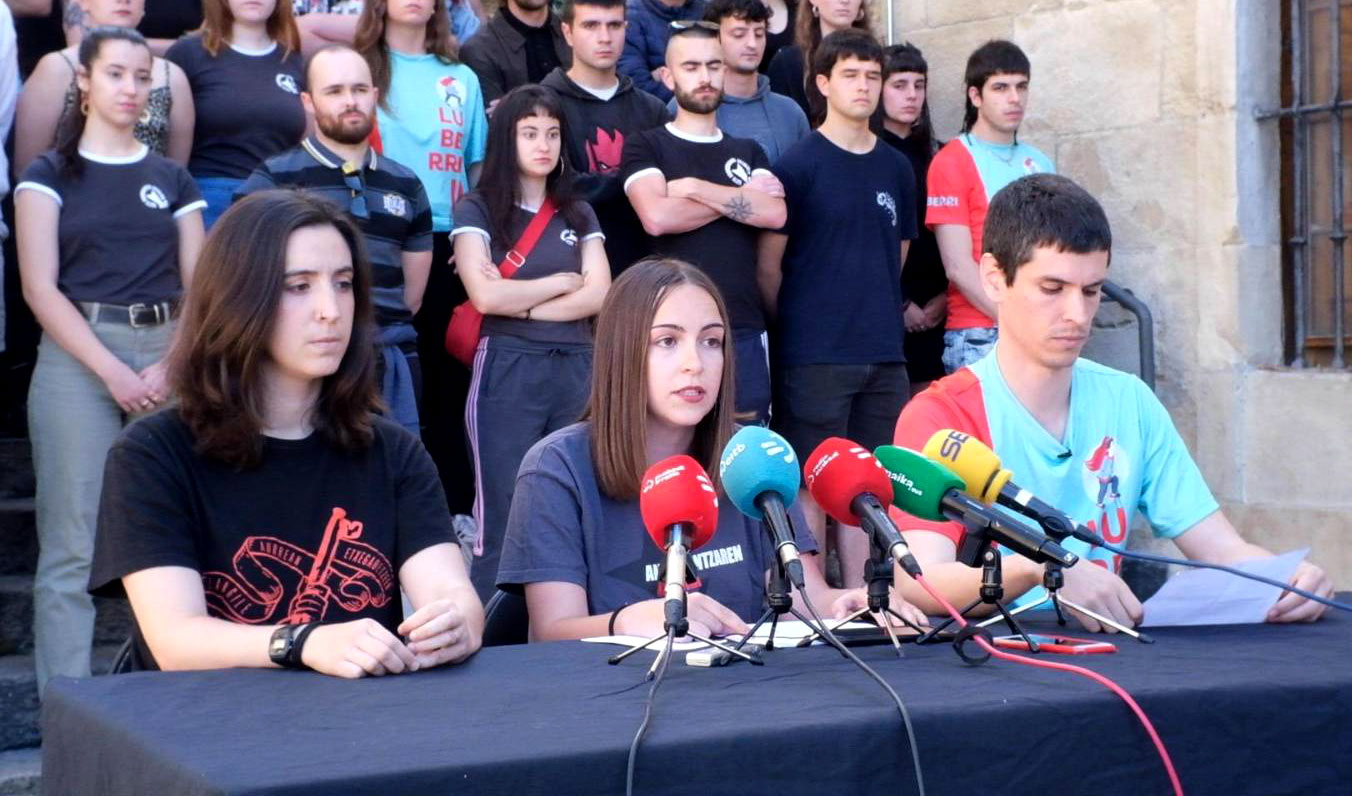The health crisis will force the Vitorians to abandon their habits and celebrate the celebrations of the White Virgin from the patio of their house. But, beyond mere celebration, the festivities also support the annual activity of different agents, including GEU Gasteiz Euskalduna. Azaitz Unanue (Vitoria-Gasteiz, 1978), manager of the GEU association, has made it clear that they have had to do things differently throughout the year and that seeing the source of income offered by the txosna of the plaza del machete has forced the members of the association to seek new opportunities to reverse the situation. Among other initiatives, a public fundraising campaign has been launched to ensure the actions carried out throughout the year.
It's early August, and where they should be prepared, there's no trace of the GEU txosna. What comes to mind in this situation?
View like this, quiet. The previous years we'd be sweating, the boxes were up, the boxes were down ... "Remember how the bar was last year... you have the pictures last year... I don't find them..." Even if you try to have everything ready, until the last hour there is a lot to do.
However, for the GEU Association, the suspension of the txosna should be a tough blow.
Of course. In the end, it means losing one of the main financing routes of the GEU association, as well as losing the presence of the Basque country at the parties. This source of income gives the association the freedom to develop its own strategy, invest in important projects or bet on projects that do not receive external assistance. That is very important, and the absence of this influences a lot on the day-to-day partnership. Please note that at present one third of our days are in temporary employment regulation...
And in order to cope with the situation, you have launched a campaign of citizen aid. Have you responded well so far?
"It is important for people to see that they are behind, that they respond and that they see the need to fund or support the work of the UDHR."
We are very happy with the answer. It's partly a reflection of what we have around us. In the txosna there are many partners, both in the assembly and in the 200 rounds that this txosna has. They usually work around 160 people a year, and we have now seen that physical aid as a financial contribution. We are satisfied because we have achieved the minimum set before what we expected, which gives enormous peace of mind. It will be a small funding, because it has nothing to do with what the txosna gives us, but it is important to see that people are behind, that they respond and that they see the need to fund or support the work of GEU… and that the answer has been immediate. In addition, times are not the best, some because they are on holiday and others do not live an easy economic situation at home, so we very much appreciate the contribution that people have made to us.
We are talking about txosna, but in recent years the GEU Partnership has extended its activity to many areas, and many of these actions have also had to be suspended. How have you experienced the last few months?
It's been a bittersweet experience. The pandemic situation influences morality, both in the work team and in the citizenry, but it also allows you to see the response of people. We had already done an analysis of the importance of taking steps towards the digital arena, and somehow we had it as an annual target, we were forced to launch it in February. It should be taken into account that almost all the activities carried out by the GEU association are in contact with the people, they are face-to-face: performances, workshops, guided tours... Euskera as a language is a tool to relate and we base our work on it. So we've made an effort to bring that to digital, and the truth is, we've had a better response than we expected, we're very happy with it.
In the autumn the Mintzalagun project, one of the projects you manage, for example, begins. How do you plan the course?
We had to adapt. In Mintzalaguna we have about 60 groups and at first we invite you to continue participating online, of all of them we have had the answer of about 40 groups, they have continued collecting online, they have sent us pictures of the meetings... so we are happy. Among the participants there are people who are not used to using these kinds of tools and we have given them tools to work, and they have responded well. For next year, the forecast is that participation will be halved, but we will make an effort to go beyond that figure and I believe that we can do so. It is true that the approach that will initially be carried out will be online, but we will see how the situation is, that we want to do the actions in person as soon as possible.
Among the many activities we have mentioned, Euskaraldia also stands out, which has become very important in recent years. What will happen in this year’s edition?
Nobody knows. In principle, Euskaraldia continues. This year the budget we had planned with the City Hall has been affected and we have had enough cuts. We have tried to work accordingly, adjusting to the new situation. At least the idea we had in mind advances. We have had contact with several entities, we are taking things out on the net, doing promotional actions, we are planning training for September, and in principle there is nothing to say that Euskaraldia is not going to be done. But it is true that today we do not know what will happen next week.
What can be the success of Euskaraldia?
Euskalgintza has long done this analysis, that is, the need to move from knowledge to use. And gradually, society has been internalizing. You see that Euskera has added value. I think the opportunity to relate to the Basque is important; that ability to bring it to the intimate environment, to affinity, to closeness.
On the other hand, what can we do to attract those who today do not feel attachment to the Basque people?
It has to be an invitation. They see with them the difficulties they have... We often say that all of this is a big complex. The one who knows Euskera very well has a complex to not understand others or to be aware of the other... the one who does not know it has a complex to pave, a kind of embarrassment to make ridicule... and this must be broken. In the end, Euskera is a tool that serves to bring us closer, to create relationships. And that's the most important thing. Those who do not know Euskera have to be drawn from there, from invitation and empathy, and knowing that some may have difficulties. The point is that learning Basque needs time and to do so the institutions have to give people the opportunity to do so.
Apparently, there are many citizens who have a favourable attitude towards the Basque Country and have shown that they are willing to cooperate with it. Can the same be said of public institutions?
"From the outset, Euskaraldia has been a manual project of the institutions and the popular movement. That is where its success lies and that is what we must continue to do.
For example, from the outset, Euskaraldia has been a manual project of the institutions and the popular movement. That is what your success lies in, and that is what we have to follow. What the institutions have to do is put in place policies to activate the use of Euskera in their organisation or in their promotional areas; but they also have to put funding on the table. The grass-roots initiative has the capacity to move forward on a voluntary basis. Throughout the year, it has structures that ensure that the work is carried out, but which have forecasts that place serious difficulties when it is not carried out. In other words, if the aid to which it has to deal does not arrive in time, the entity has to contribute its money, and that is often impossible. A project can be broken down by time issues. That is what the institutions should take into account. And I understand that the institutions at the moment have other priorities, and that the situation is not easy. Many technicians do not even have an answer, they are waiting for what comes from above, and the responsibility is not theirs, it is the responsibility of those who have to make decisions.
Many sectors will be hit by the crisis, but would you say that measures have been taken to safeguard Basque cultural activity well?
We do not think so. For example, an exhaustive and reflexive analysis has been carried out around the Council of the Basque Country, agreed by different sectors of Basque cultural activity. That is on the table and the institutions already know what the situation is. The Basque country has disappeared at some points in the pandemic, and there is the consequence of not believing or not making this transversality, which is often referred to. The Basque country is always transversal, it is always in the structures linked to the government, etc., but it is not carried out. When things come in a different way, the Basque Country disappears. That says a lot. I believe that Euskera should be put to the fore, as should other issues, such as feminism or environmentalism. Euskera is an axis of Basque society because it brings us closer, because they are relationships that occur in the intimate environment... and we must take care of it.
In Álava the Basque Country has taken a great step forward in recent years. Will this trend continue?
"In Vitoria-Gasteiz and Álava there are many people who love the Basque language, who want to promote the Basque language and who want the Basque language to be their usual language".
I think so. We have made a qualitative and quantitative leap. You have to consider where we came from when we started talking about sociolinguistic data or evolution. Vitoria-Gasteiz started from scratch forty years ago, well or almost from scratch, and see what the current situation is. This development remains positive and this is demonstrated by the success we have had in the various actions. People need it and people ask for it. The pandemic will affect everything, but I think Álava has reason to be positive. In Vitoria-Gasteiz, the Basque country has increasing strength, half of the population is Euskaldun, and in terms of use we are the second capital of Euskal Herria, and this must be underlined. That is for something: because there are many people in Vitoria and Álava who love the Basque country, who want to promote the Basque country and who want the Basque country to be their usual language. That is why we have come here.
Will we make an appointment for the toast in the txosna in 2021?
Of course yes, toast!
























